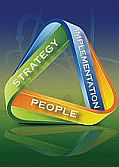Speaker
Dirk Schmidt
(DIALOGIS)
Description
Location Intelligence (LI) means using the spatial dimension of information as a key to support business processes. This spatial dimension has to be defined by geographic coordinates. Storing these spatial objects in a database allows for attaching a 'meaning' to them, like 'current position', 'border', 'building' or 'room'. Now the coordinates represent real-world objects, which can be relevant for the measurement, documentation, controle or optimization of (parameters of) business processes aiming at different business objectives.
But LI can only be applied, if the locations can be determined with an accuracy (in space and time) appropriate for the business process in consideration. Therefore the first step in any development of a LI solution is the analysis of the business process itself regarding its requirements for spatial and time resolution and accuracy. The next step is the detailed analysis of the surrounding conditions of the process: Does the process happen indoor and/or outdoor? Are there moving objects? If yes, how fast are they? How does the relevant environment look like? Is technical infrastructure available? Is the process restricted by regulations? As a result, a proper Location Detection Technology (LDT) has to be chosen in order to get reliable and accurate positions of the relevant objects.
At the highly challenging conditions of the business processes IAEA inspectors are working with, the chosen LDTs have to deliver reliable positioning on 'room-level' accuracy, even if there is no location enabling infrastructure in place, the objects (people) mostly are indoors and have to work under strong regulations.
The presentation will give insights into innovative LI solutions based on technologies of different LDT providers. Pros and cons of combinations of different LDT (like multi-GNSS, IMU, camera, and human interaction based positioning) will be discussed from the perspective of the IAEA inspectors' specific requirements.
| Country or International Organization | Germany |
|---|
Author
Dirk Schmidt
(DIALOGIS)

